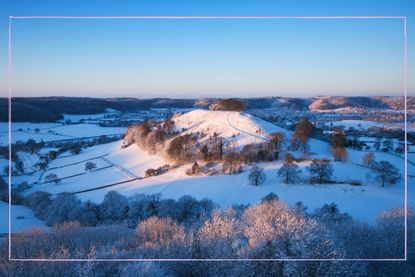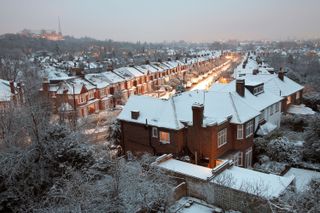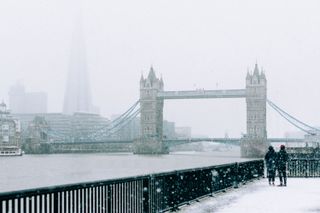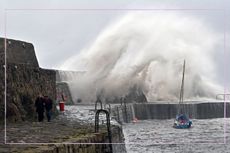Will it snow in the UK in 2023? Latest snow forecast
We look at the weather predictions for the UK to find out when it will snow this year


When will it next snow in the UK is the question on many people's lips, as many areas shave already seen the arrival of white flurries.
December is here and has brought snow with it, as Cumbria in particular was hit by heavy snow - leaving many homes without power and some motorists stranded. The snowfall has left some wondering if we will have a white Christmas in 2023, while others have begun to stock up on kids' winter boots, waterproof gloves and puddle suits, in order to make the most of the wintry weather.
For many, the snow is already melting, following a slight increase in temperatures, but the Met Office has warned that several areas should brace for further snowfall - while those who missed out this time around are wondering if they will see any white flakes this year. We've taken a look at the forecast and previous weather trends, and here's everything we know so far about when and where snow could fall next in the UK...
Will it snow in the UK in 2023?
Many areas of the UK have already had snow in 2023, and the Met Office has now confirmed that the UK could experience more snow in the next few days, with a number of weather warnings still in place.
This is because of an Atlantic air mass, which is bringing less cold conditions to many southern areas, but continuing to hold cold air in the north. Met Office Chief Meteorologist, Jason Kelly, explained: "Where these two airmasses meet is the focus for continuing ice risk. For parts of northeast Scotland, wintry showers will bring some icy conditions overnight, as well as some accumulating snow inland."
❄️ Snow showers continue to affect northwest England this evening with a risk of ice📉 Clearer spells further north and east, and turning cold with a widespread frost ⚠️ Stay #WeatherAware pic.twitter.com/nMHPvzUuFHDecember 2, 2023
The Met Office adds that snowfall in late autumn or early winter doesn’t generally linger, because ground temperatures broadly remain relatively high after the summer, especially compared with later winter, after the ground has lost more of its warmth.
The weather service explains that for snow to fall, the air needs to be cold enough and there needs to be a supply of moisture. To get cold air in the UK, there needs to be winds from the north or east, but the most common wind direction in the UK is south-westerly - making snow a rare occurrence in most areas.
If there is an easterly wind, it either needs to meet a rain-bearing weather front and turn it into snow, or for the cold air to pick up enough moisture from its short journey across the North Sea to form showers.

When is it going to snow in the UK?
The Met Office has said that "a continued risk of widespread frosts and hill snow" is expected in the week beginning December 4. However, they add that towards the end of the week, "Temperatures should return back to around average for most as wetter and windier conditions become established."
Meteorologist Jason Kelly has said, "Rain will become the main hazard and a yellow warning for rain has been issued for Monday for parts of the South West. Warnings may well be updated over the coming days so keep up to date with the forecast in your area."
With that said, the Met Office explains that snow forecasting in the UK is difficult. Because it’s so cold high up in the atmosphere, most precipitation either starts as snow or supercooled raindrops, but as it falls to earth, it moves through warmer air most of the time and melts into rain.
They add that weather fronts mark the boundary between cold air and warm air, so when a weather system moves in, there will be warm air and moisture wrapped up in it. While we need the moisture for snow to form, the warm air makes it very tricky to forecast. This is because as the warm air bumps into the cold air, the air mixes together and makes the cold air slightly warmer, and the warm air slightly colder, and so then rain becomes more likely.
Therefore, there’s a fine line between who sees snow and who sees rain - sometimes a fraction of a degree is the difference between rain and snow - which is why it's unlikely we'll know to expect snow until it is just days away.
Where is it going to snow in the UK this winter?
As is usual for the UK, the areas most likely to see snow in 2023 will be areas of higher ground in the north, such as the Scottish Highlands.
However, the Met Office has said that should snow fall in any other areas of the UK over the next couple of days, it will be confined to the higher parts of northern and central Wales and northern England.
Will it snow in London in 2023?
London saw some brief flurries of snow in recent days, but the Met Office has not forecast more snow for the capital at this stage.
Snow is rare in London, and World Atlas says data from the Met Office has shown "on average, the central parts of London experience less than 10 days of snow or sleet every year...for the few days that it snows in the central parts of London, the snow rarely settles since it melts away extremely fast."
The outskirts of London as well as areas with higher altitudes tend to get more snow, as the urban centre of the capital often has a higher temperature. This causes snow to melt more quickly and makes it unlikely that snowflakes will settle.
The exception to this, of course, was the 'Beast from the East' in 2018, which saw the entire UK experience 10 days of heavy snow in late February.

How much snow does the UK usually get?
According to the Met Office, the UK gets on average 23.7 days of snowfall or sleet a year. The majority of this snow falls on higher ground where temperatures are lower.
In Scotland, the figure is much higher, with snow or sleet falling on 38.1 days out of the year on average. The Cairngorms in Scotland are statistically the snowiest place in the UK, with 76.2 days of snow or sleet falling per year on average.
In contrast, Cornwall is the least likely to get snow, with an average of only 7.4 days of snow or sleet falling a year.
However, because most of this snow does not settle, the number of days the UK sees snow on the ground is much lower. On average, there are 15.6 days a year where snow is on the ground in the UK, compared to 26.2 days in Scotland.
How cold are the temperatures predicted to get in the UK?
Data from the Met Office's UK climate averages shows that from the period of 1991 to 2020 the coldest month of the year on average is January, with an average maximum temperature of 6.66°C and an average minimum temperature of 1.21°C.
So far this year, the coldest temperature recorded in the UK was -7.7°C in Shap, Cumbria, on the morning of Saturday 25 November.
Average temperatures in the UK in December by country:
- England - Minimum 1.87°C, maximum 7.6°C
- Scotland - Minimum 0.37°C, maximum 5.82°C
- Wales - Minimum 2.16°C, maximum 7.58°C
- Northern Ireland - Minimum 1.91°C, maximum 7.53°C
If you're getting ready for the colder weather, you might want to find out how cold it needs to be for schools to close, and what temperature is too cold to walk your dog.
Goodto Newsletter
Parenting advice, hot topics, best buys and family finance tips delivered straight to your inbox.

Ellie is Goodto’s Feature Editor, having joined the team as a Junior Features Writer in 2022, and covers everything from wellbeing for parents to the latest TV and entertainment. Ellie has covered all the latest trends in the parenting world, including baby names, parenting hacks, and foodie tips for busy families. She has a distinction in MA Magazine Journalism from Nottingham Trent University and a first-class degree in Journalism from Cardiff University, and previously Ellie has worked with BBC Good Food, The Big Issue, and the Nottingham Post, as well as freelancing as an arts and entertainment writer alongside her studies.
-
 Rochelle Humes' adorable note left by her six-year-old shows how quickly kids pick up on big changes at home - psychologist shares her top tips on how best to prepare them
Rochelle Humes' adorable note left by her six-year-old shows how quickly kids pick up on big changes at home - psychologist shares her top tips on how best to prepare themValentina picks up on what will help her mummy while daddy is away
By Selina Maycock Published
-
 Does your relationship pass the 'Beckham Test'? The viral trend is taking TikTok by storm, so how does your partner compare to the world-famous footballer?
Does your relationship pass the 'Beckham Test'? The viral trend is taking TikTok by storm, so how does your partner compare to the world-famous footballer?Is your relationship as strong as David and Victoria's? We share what the 'Beckham Test' is and how to try it for yourself
By Ellie Hutchings Published
-
 What is a 'Boy Mom'? We explain the TikTok trend and why it's so controversial
What is a 'Boy Mom'? We explain the TikTok trend and why it's so controversialKim Kardashian says she's a 'Boy Mom' - but what does it mean and why is it controversial?
By Ellie Hutchings Published
-
 New parents are favouring ‘old lady’ baby names for Generation Alpha
New parents are favouring ‘old lady’ baby names for Generation Alpha'Old lady' baby names are getting a new-age feel for children between 2010-2024
By Daniella Gray Published
-
 Parents, this teacher has just revealed what they’d *really* like from your kids this Christmas
Parents, this teacher has just revealed what they’d *really* like from your kids this ChristmasSince parents are asking…
By Daniella Gray Published
-
 Why we need to rethink how we give praise for ‘stronger’, more resilient kids – according to a Harvard-trained parenting expert
Why we need to rethink how we give praise for ‘stronger’, more resilient kids – according to a Harvard-trained parenting expertAn expert shares her technique for helping children thrive
By Daniella Gray Published
-
 Mum shares the "ultimate hack" for picking up LEGO, hint: it involves a sock
Mum shares the "ultimate hack" for picking up LEGO, hint: it involves a sockTired of picking up your kids' LEGO? You only need a vacuum cleaner and an old sock to try this viral hack that promises to make the task so much easier
By Ellie Hutchings Published
-
 Wondering whether your child should get the chickenpox vaccine? It could become available on the NHS - here's why
Wondering whether your child should get the chickenpox vaccine? It could become available on the NHS - here's whyThe government has been advised to make the jab available to all children, so parents want to know if the chickenpox vaccine is available on the NHS.
By Ellie Hutchings Published
-
 Why do we celebrate Bonfire Night? The history behind the tradition
Why do we celebrate Bonfire Night? The history behind the traditionBonfire Night takes place on November 5 every year - and many want to know the origins of the celebration
By Ellie Hutchings Published
-
 Where will Storm Ciaran hit and when? Latest forecast
Where will Storm Ciaran hit and when? Latest forecastStrong winds and heavy rain are on the way to the UK, as Storm Ciaran approaches. We share where it's expected to hit.
By Ellie Hutchings Published